March-April 1998
Angola Diary
By Fr. Efren de Guzman SVD

March 21
I was awakened late at night by a desperate call: “Mano, Mano, (meaning brother). Come and help Devota.” The caller said their relative, an eighteen-year-old girl was thrashing about so violently like an animal. She seemed to be possessed by an evil spirit. Reaching the house, she growled at me like one possessed: “I know you and you don’t know what you are doing.” (The voice was like a hyena) a thought struck me: “Look at her eyes” The ‘demon’ would not look back but said: “She’s mine!” I said, “Leave her now, for I will call on the name of Jesus and the forces of heaven to overcome you.”
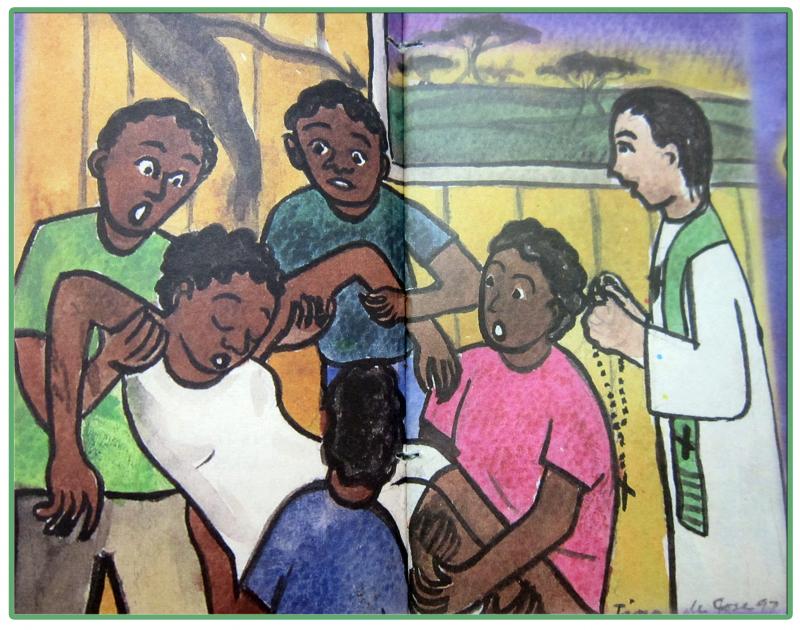
A foul odor was coming out of her mouth and her eyes were rolling around. She was shouting out blasphemies; it took four men to control her. We were all afraid, but we kept praying the rosary and singing: “Lord Jesus, only your love can liberate our sister! Save her Lord Jesus!”
Finally, I noticed light invading the house; the sun was already rising. And then suddenly the ‘demon’ left her. Through our prayers and through the name of Jesus, the spirit was overcome!
March 22-23
Casas Novas (near Funda Leper Colony). Preparation and formation of the Youth from different villages. We have 80 participants and 20 observers. Last year we gave the following courses: Bible, Electrical and Mechanical Course, Para-Medicine, Portuguese, English, Economics. For now we continue this project wit ha good team of well-paid teachers.

Angola Flag
March 24, last Sunday of Lent
Our leper catechist shared with us this text: from Psalm 119: “It is good I’d been afflicted; that I might learn your will, O Lord!” this psalm was written by a man who learned that difficulties are part of the Lord’s gracious plan to keep us on the pathway of truth.
March 28, Thursday
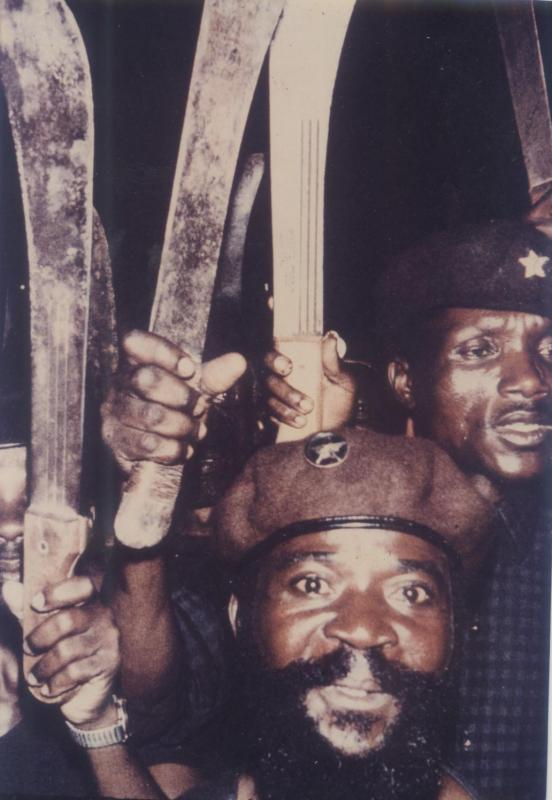
Some UN observers were ambushed in the southern part of Luanda, two were killed, three were wounded. Later we also heard the news that our old Capuchin friend was killed by bandits near Huambo. He was trying to bring food for the sick and the displaced people.
Recently two main electric lines broke down; this will cause great crisis of water and electricity for some weeks or months in the capital and in the provinces. And suddenly the price of water and other basic commodities will jump.
March 30, Saturday
The car of our Mexican confrere, Fr Gustavo, was stolen. This was the 49th missionary car lost in Luanda.
April 4, Thursday
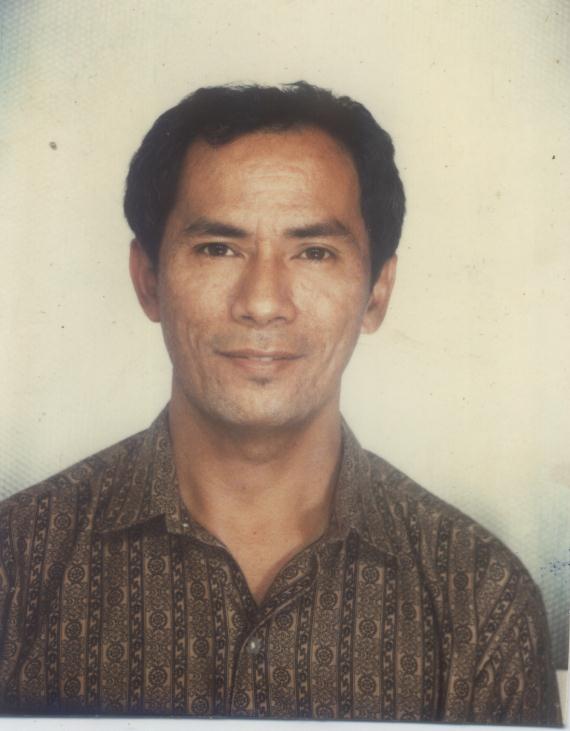
Meeting of Commission of the Refugees of Africa. They requested me to represent Angola for another meeting in Karare, Zimbabwe. Today we remembered and prayed for the innocent people who wee massacred in Rwanda and Burundi. One million people were killed, mostly Tutsis. More than two million refugees in Zaire and neighboring countries. One of the delegates said: “God develops our spiritual power through the pressure of difficult situations and places. And failure is not defeat until you stop trying.”
P.S. Here’s a song for you
Slavery
An evil of the distant past;
Millions of people are still in bondage
A startling underworld of hunger and torture
Deep-rooted systems of servitude
That even the victims don’t question.
Human bondage still holds millions in grip
Tell me how this ancient evil survives? (2x)
The exploited are always faceless
Set apart by race, caste and religion
Those who profit from slavery
Have money and political clout
And world doesn’t mind, so why should the powerful change.
How long must the slaves wait?
Is this a bleak thought: nothing gets done?
What’s your response to the world’s tyrannies?
Father Joeker

By Fr Joseph Panabang SVD
Catholic Dog
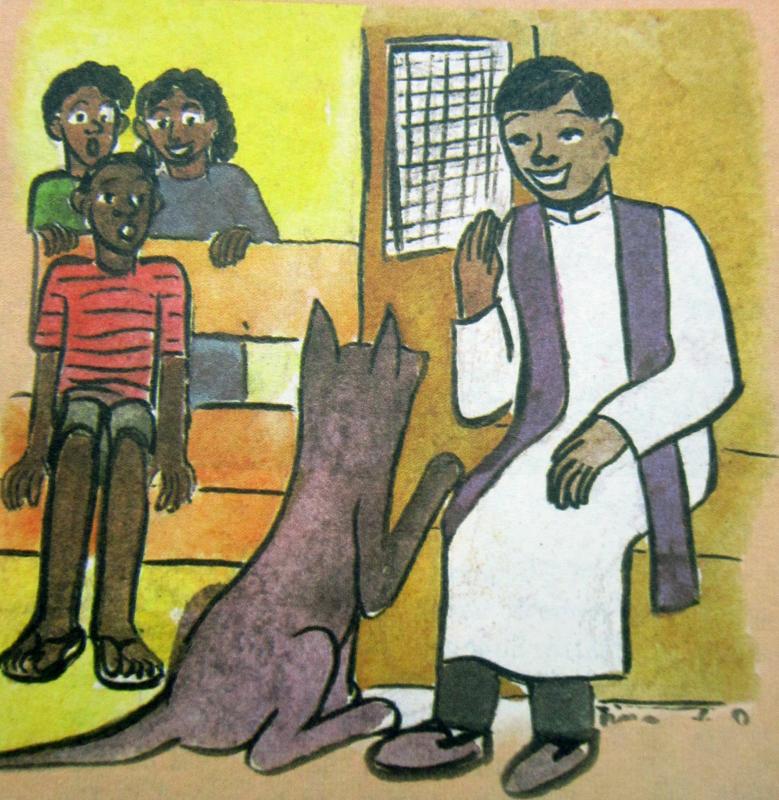
Before every Sunday Mass in Kintampo we usually have confession. But one Sunday I had been waiting for a long time but no one came. "This is unusual,” I told myself. Then I heard someone saying, “Oh Rex is also going to confession?” I turned around and saw our big dog Rex sitting behind me. People were afraid to come to confession. "Okay, Rex, you are forgiven. Go” Obediently the dog left to the relief of the people who wanted to go to confession.
Half-Baked
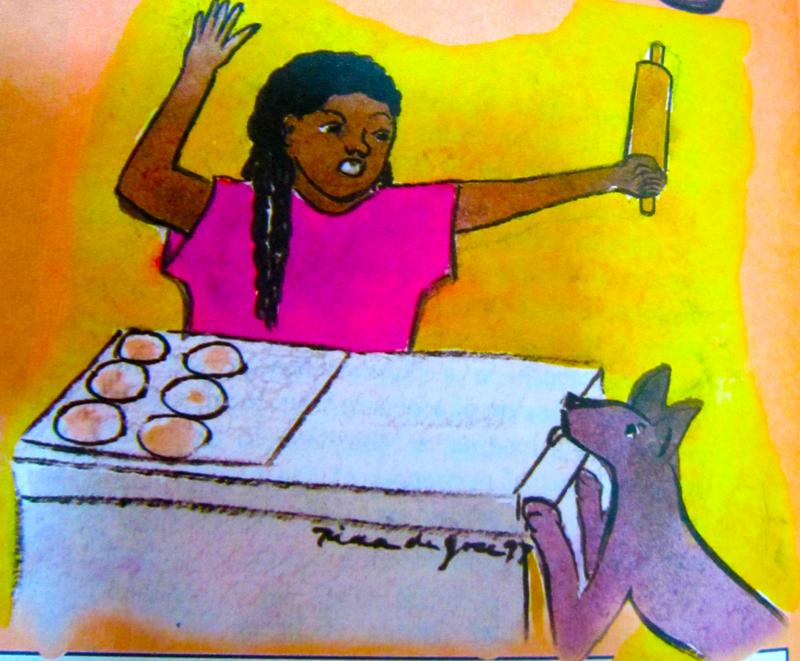
When our local oven in the parish was assembled completely, we were all excited watching our cook do our first baking. But we did not succeed in our first attempt. The bread was too white, obviously half baked. So we heated the oven again and placed more wood. This time when we took the bread out of the oven, it was black! Over-cooked, literally burned. The cook blamed Rex, our big black dog, as the problem because he was always causing delay. Our cook went to observe other bakers in town. Then she tried baking again all by herself. I decided not to go near her while she was doing some baking for fear of being made the next scapegoat. The bread turned well. Lucky I stayed away. (P.S.) I thought it was unfair to blame Rex since he had just been to confession.)
Vida and Ophelia
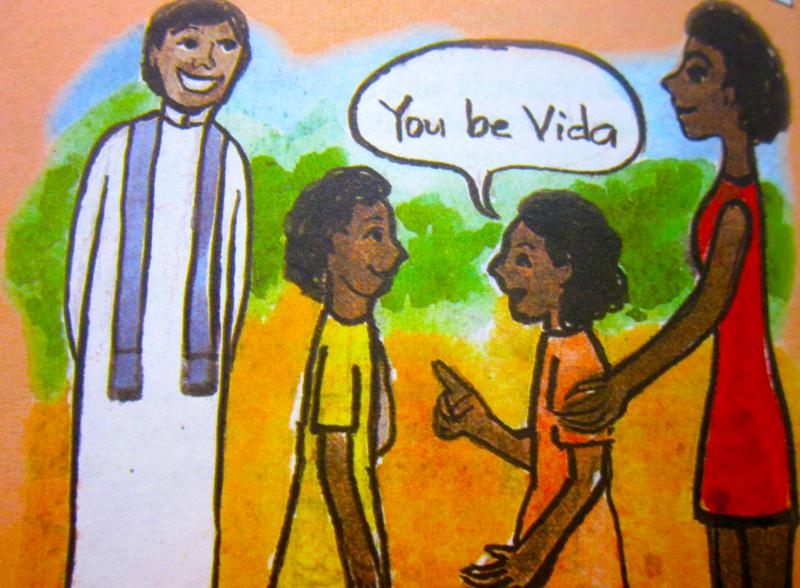
A little girl was crying terribly, trying to unloose herself from her mother’s grip. She threatened to roll on the ground. Her mother was worried the little girl might soil her white dress. I asked the mother what was wrong with the child. The mother explained that the child prefers the name of her sister ‘Vida’ that the name given to her which was ‘Ophelia’. No amount of explanations could convince the little girl to like the name ‘Ophelia’. Then finally I explained to the child how much more appropriate the name Ophelia was to her—it suited her good looks! She ran to her sister and said, “You take Vida, I’ll take Ophelia.” Simple as that for two happy children.
No U-turn
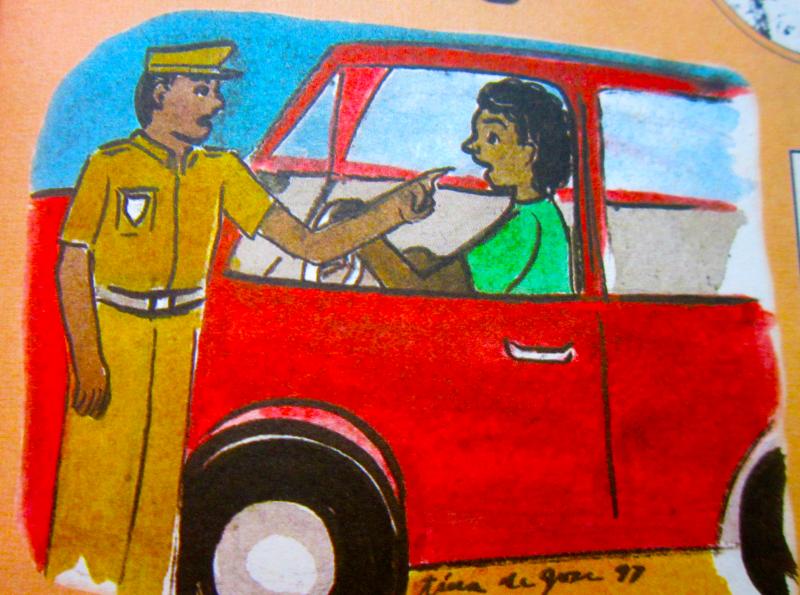
A Ghanaian driver making a U – turn at a NO U TURN junction was caught in the act by the policeman. The policeman pointed to the driver the NO U TURN sign and asked, “Did you see that?” “Yes, I did not see you,” the Ghanaian driver smartly replied.
Definitely No Piranhas
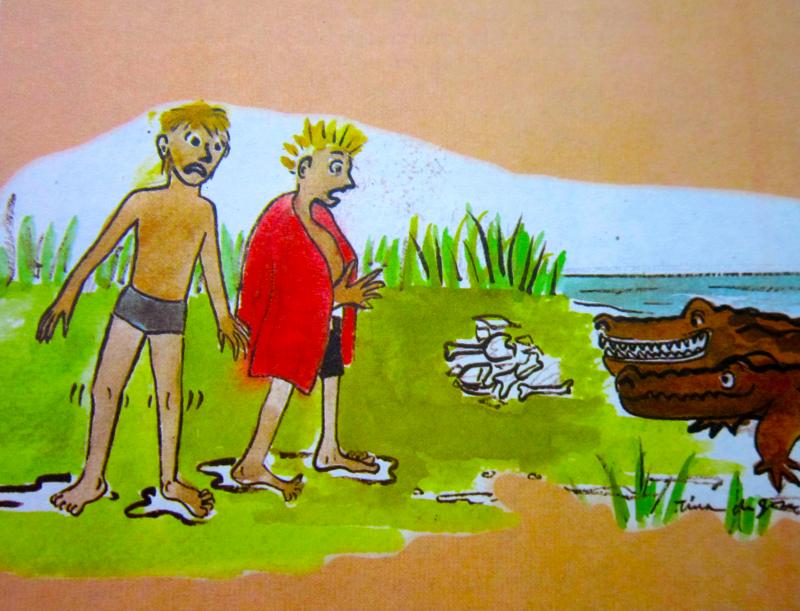
A Polish tourist and his son stopped for a night at Kintampo. He was sharing with us one of his experiences in the Amazon River in South America. Before deciding to swim in the Amazon River, he asked their guide if there were Piranhas in the river. The guide assured him that there were no Piranhas. After a good swim, they ate and threw their leftovers into the river. Thereupon from the bank were they had been swimming, two big crocodiles started swimming their way gracefully to feast on the scraps. Shocked, he berated, the guide, “How could you allow us to swim?” the guide retorted back, “You only asked about Piranhas not crocodiles.
Missionary Express

A number of our villages are inaccessible by car during the rainy season. So I visit them by foot. I leave the parish early in the morning and start walking my way to the villages with my native haversack hanging at my back. I would reach the villages just before the villagers go to their farm. Because of my style in visiting them, the people call me, “Osofo trotro” meaning priest-bus or Missionary Express.
Guardian Of The Angels
By Claire Wallerstein
The Philippines is a target for sex tourist. Thousands of children are exploited and degraded by pedophiles. A journalist in Manila profiles a missionary priest who has despaired of the authorities and taken a personal initiative against the trade.
A middle-aged tourist in a baseball cap sits at the sleazy bar sipping a beer, and watches the young Filipina dancers gyrating suggestively on stage. After a while, the owner of the joint sidles up to him. “You like the girls? You wanna take one out for the night? Only 500 pesos.” “Maybe, but I really wanted something younger.” “No problem”, replies the proprietor. “I’ve got girls, 14, 15 – virgins too. But they’ll cost you more.”
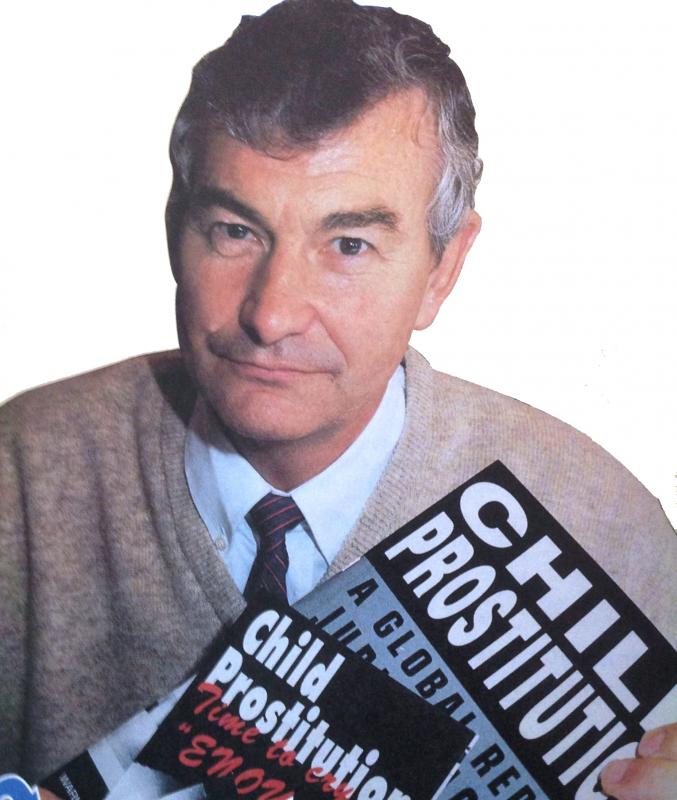
Fr Shay Cullen
This scene is typical of the sordid deals brokered any night of the week in the girlie bars of Angeles City, capital of the Philippines’ thriving child sex trade. There is just one thing which is not as it seems. The tourist in the baseball cap is not a pedophile -- he is a priest. And in his shirt picket is a tiny, hidden camera which may have recorded enough evidence to put this brothel, one of a staggering 200 in Angeles, out of business.
100, 000 victims
The priest, Fr. Shay Cullen, a 54-year-old missionary, has lived and worked in the Philippines fro the past 28 years. Far from his home town of Glasthule, just south of Dublin, he is waging a personal war on the country’s child sex industry, which the United Nation Children’s Fund (Unicef) estimates “employs” 60, 000 youngsters nationwide.
Fr. Cullen believes the true figures could be 100, 000. While ministers of tourism and officials of non-governmental organizations from 60 nations attended the World Tourism Organizations conference in Manila, he voiced fears over the Philippine Government’s plans to boost tourist numbers from 2.04 million last year to five million by the year 2000.
Street Children
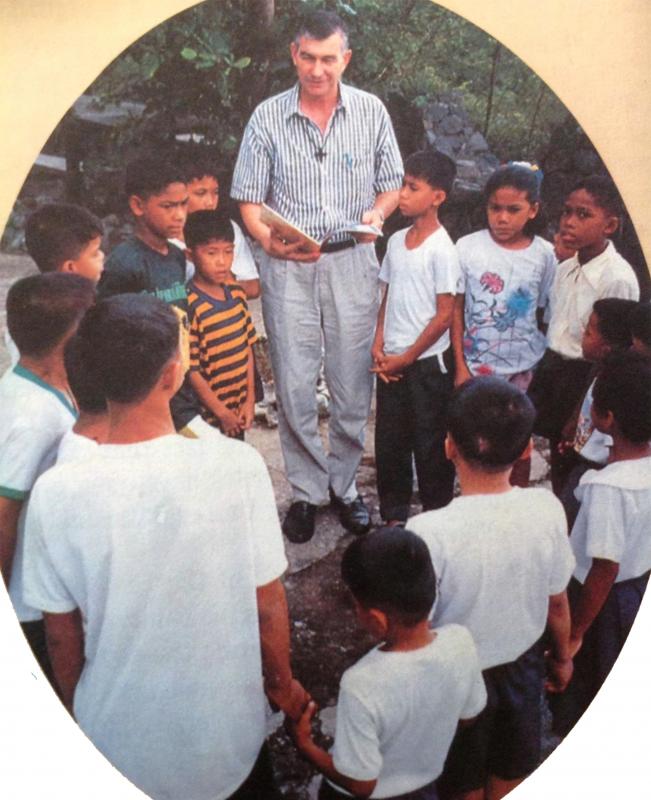
Fr Shay Cullen with
the children in the
orphanage
Filipinos earn the lowest wages in Southeast Asia, and 1.5 million children live on the streets. Fr. Cullen warns this could provide a huge potential supply of starving youngsters willing to sell themselves for sex if care is not taken to encourage socially responsible tourism. His warning is based on alarming first-hand evidence of pedophile operations in the Philippines.
Back in 1994, the softly-spoken priest, frustrated by the rampant corruption and inefficiency he found within the police force and authorities, decided to turn the tables on the pedophiles by going undercover and tackling them on their own territory.
By night, acting on tip-offs from a growing network of sources, Fr. Cullen abandons his more orthodox priestly duties. Wired for sound, he and his dedicated team cruise the parks and streets of Manila, Angeles and Olongapo, or bars where minors have been spotted working as hospitality girls with fake IDs, or being “rented out” from back rooms by bar owners.
Priest Beaten Up
Fr. Cullen uses his recorded evidence to obtain arrest warrants from the Philippine courts, and organizes a few police officers – who can be trusted not to tip off the targets – into raiding the clubs. He has been beaten up several times by thugs protecting the racket, and even received death threats.
But he can boast that his unconventional tactics have had success. A procession of local and foreign pedophiles-including Brett Tyler from Britain, the murderer of 12-year-old Daniel Handley -- have been rooted out and brought to justice as a result of his work.
Fr. Cullen’s base is in a hilltop house just outside Olongapo City. Here, his PREDA Foundation (Prevent and Rehabilitate Drug Abusers) runs a centre originally set up in 1974 to help drug addicts, but now largely concerned with caring for the victims of pedophiles.
20 Years Jail
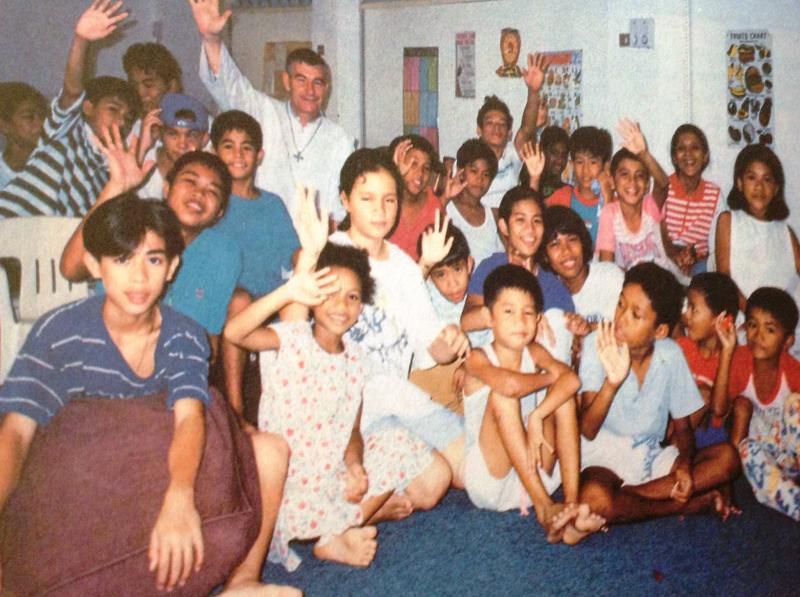
Fr Shay Cullen and his angels
The foundation’s high-profile campaigning also helped to prompt the introduction in 1992 of Philippines Child Protection Law RA 7610. This means child prostitutes are for the fist time viewed as victims rather than offenders, and any adult found in a secluded place with an unrelated child technically faces a jail term of seven to twenty years. Previously, pedophiles were merely deported, allowing them to escape justice while legal and prison costs were saved. PREDA has also pushed for the adoption of legal changes in Western countries, so that pedophiles who flee the Philippines can now be prosecuted in their home countries.
These changes have led to a huge increase in the number of cases of child sex abuse reported to the Department of Social Welfare and Development -- up from 84 in 1993 to 2,621 in 1996. But despite these successes, and the fact that many of the neon sex bars in Olongapo and Angeles have gone out of business since the closure of the nearby United States military bases in 1992, Fr. Cullen refuses to rest.
The Philippines is still seen as one of the cheapest and most attractive destinations for pedophiles, he points out. There are at least five Internet web sites promoting the country as a place for sexual encounters, and, as more and more tourists arrive and foreigners come to retire, the problem is likely to get worse.
Harder to tackle
If anything, he says, pedophile has become harder to tackle since the American forces left and the laws were tightened up. “It’s been driven underground, and has become more ‘residential. You get pedophiles who come over here to buy a place. They ingratiate themselves with the local kids, give them gifts, or money. One man can molest dozens of children.
“Their methods are fairly sophisticated. They will befriend a family, sometimes they will pay the children’s school fees, or they might even marry a single Filipina woman as a front, and adopt her children. Even if we manage to track these people down and get cases to court, they can drag on for years. Defendants pay off witnesses who often aren’t in a position to be able to refuse large cash sums, and some judges and prosecutors are corrupt and accept pay-offs also."
Root Causes
There is no simple solution. Fr. Cullen believes a more equitable distribution of wealth and better education are two of the first steps needed to remove the root causes of the deprivation and unemployment which can lead to prostitution, diseases, drug abuse and crime. But with 12, 000 of the country’s 43, 000 rural districts still without even an elementary school, it could take years if not decades for these changes to materialize.
At times, he admits, he is pessimistic about the future. “Look what terrible things our small team has discovered in a short time, and often by accident. You can’t change a whole culture overnight, but until corruption is rooted out in the Philippines, until police and politicians stop profiting from protecting the pedophiles, nothing will stop them preying on innocent children. I am a priest -- I should not have to be doing the work of the police. But at a moment, it seems that nobody else is going to do it.”
Nicaragua Still Hopes
By Sr. Margarita Jamias, MM
Nicaragua, land of lakes and volcanoes, is a small Central American country the size of Massachusetts. It has a population of 4 million people. Like the Philippines, it is tropical and has similar flora and fauna. The church has been deeply involved in the people’s struggle for liberation. Sr. Margarita Jamias, MM from Masinlok, Zambales, educated in Maryknoll College and Ateneo, tells us of the struggle to promote Basic Christian Communities in Nicaragua.
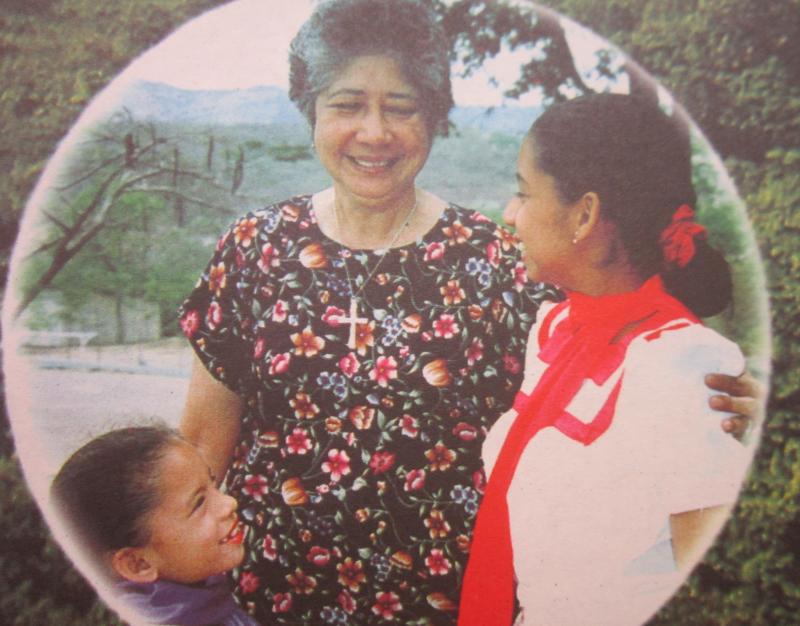
Painful History
I was assigned to Nicaragua in 1974. The country was barely recovering from the big earthquake which devastated Managua, the capital of Nicaragua. I have been privileged to accompany the Nicaraguan people through three very different phases of their history: the Somoza Dictatorship and the Sandinista Revolution, the Sandanista period and the Contra War, and now the neo-liberal period under Violeta Berrios de Chamorro and Arnaldo Aleman. With the advent of neo-liberalism in Nicaragua, the situation of the poor has become worse. Unemployment is nationwide. From 50% to 75% of the population live under the poverty line, making Nicaragua the poorest country in the American continent.
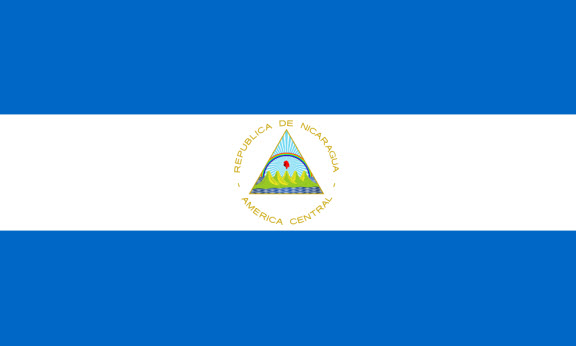
Maryknoll Sisters
In Condega, a rural area 190 kms. north of Managua, there are five Maryknoll Sisters doing a variety of ministry: herbal medicine and acupuncture, adult literacy, loans to farmers, work with women and the small Bible reflection groups. My particular work is with the women and the Bible reflection groups. I give courses to women on gender issues, Feminist Theology, women in the Bible.
Women the Mainstay
In Nicaragua more than a third of all households are headed by single mothers, the sole support of the family. Even in households headed by couples, sometimes the women support the family because the men are jobless. Women work as domestics and other service jobs or as factory workers, oftentimes Free Trade Zones with miserable salaries and tough working conditions. Reyna Rivera works from 7:00 AM to 5:00 PM hand rolling cigars for export. She earns the equivalent of $ 1.50 a day. This is the same salary the women receive whether they work in coffee processing plants or harvesting tobacco. Yes, tobacco has replaced the basic crops in the northern part of Nicaragua as big companies have offered the small farmers a more ‘profitable’ income from their land. The farmers know that eventually tobacco will exhaust their fertile land but his is the alternative they take for “sure” income as the companies provide seeds and fertilizers.
Art of Quilting
In 1966 I started teaching the art of quilting to women. They were very enthusiastic about it so that now 210 women have learned the art. Forty women have formed a Collective. They make cushions, bedsheets, bags, and placemats. They export products to the US and Germany through visiting solidarity groups in Nicaragua. The income from their quilting helps the families survive.
Difficult times for the BCCs
The Nicaragua people have deep faith. Popular religiosity such as processions and devotions to Our Lady are part of their spiritual life. The Eucharist is central to their faith. After Vatican II and Medellin, Basic Christian Communities flourished in Nicaragua. The Church took the preferential option for the poor, a similar platform to that of the Sandinista Revolution. The slogan “Between Christianity and the Revolution there is no contradiction” was taken to heart and Christian action. But under pressure from the U.S. the forces of conservatism are again in vigor in Nicaragua. A new initiative called the “New Evangelization” is replacing Basic Christian Communities in places. The challenge for us is to keep alive a Theology incarnated in the experience of the people, most of whom are financially poor. We reflect with women and their experience; we continue to explore experiences of the Sacred in our relationship with God, with others and with creation.
Teacher Mutombo
By Fr. Wens Padilla CICM

Mongolia Flag
Father Wens Padilla, CICM, a native of Tubao, La Union, Philippines, joined the CICM in 1972 and was ordained in 1976. The next year he was sent to the missions of Taiwan, where he served in parish apostolate. He was Provincial Superior of the CICM Chinese Province from 1986 to 1992, when he was appointed, together with two other confreres, to become the first Catholic missionaries to go back to outer Mongolia. Today there are six CICM men in Ulaanbataar, the capital of Mongolia. One young Zairian intern confrere died in April. Father Wens, the Superior of the District of Mongolia, tells us about Teacher Mutombo.
Sad Birthday
I’m writing this reflection on the very feast of the Assumption which is at the same time the birth anniversary of Lievin Mukenga Mutombo, a young CICM student from Zaire. But Lievin is dead! He left the Mongolian Mission on April 27, 1996 and died suddenly on May 11, 1996 in Hong Kong while attending a Session for Interns. He was on his way to the Philippines for his Theology studies.
Love for our Lady
Lievin told me that he joined the Congregation of the Immaculate Heart of Mary due to his devotion to the Blessed Virgin Mary. And indeed he took refuge in her motherly care and protection whenever he was in trouble. He taught the youth of the mission (of whom he was so fond and to whom he was so strongly attached) to pray the rosary in the vernacular. In May and October the youth were fervent in praying the rosary at least twice a week.
We Miss Him
Mongolian Mission on Trial. On this very day of his anniversary, I can’t cry hard enough for him to hear me! He’s gone! We don’t hear “MUTOMBO BAGSH” (Teacher Mutombo) shouted again on the streets by the numerous street children whom he loved and knew so well. His death put the newly established Catholic mission to the test. His enthusiasm and dedication to the young people. Street children and the poor paved the way in founding the Catholic Church presence in this non-Christian nation.
Changed not Ended
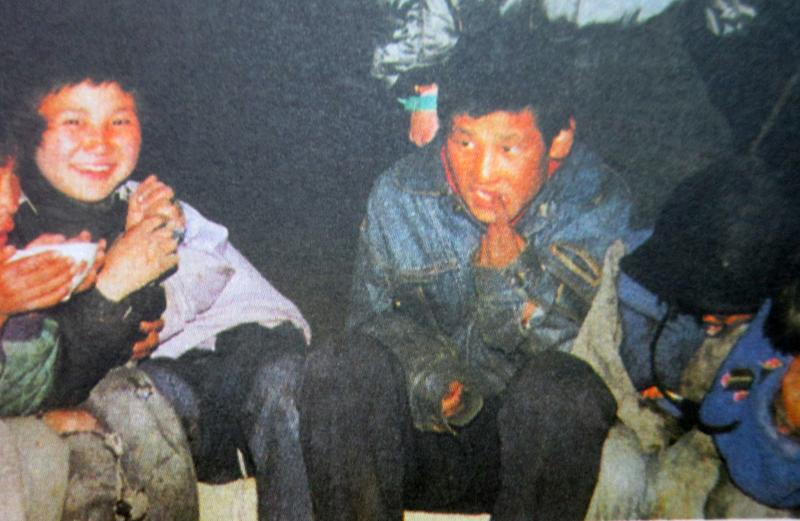
Street children are being fed by members of the youth group
His mission has changed, not ended. Those who have known how Brother Lievin worked would say “His mission was accomplished!” But others would say “His mission has changed, not ended.” I for one am convinced of the latter. The last letter he wrote me three days before he died reads: “I really assure you that one way or another I will work with you for the good of the Mongolian mission of which you are the Superior. I always pray for you and for the success of the mission given to you by the Holy See. Please pray also for me so that one day we will be together again. I really like Mongolia, the Mongolian people, and also the Mongolian mission. I do not wish to stay out of the Mongolian mission.”
If indeed Lievin likes to work in one way or another with us for the good of the Mongolian mission; and if he does not wish to stay out of the Mongolian mission, then I believe that he continues actively his ministry for Mongolia.
When is He Coming Back
People who don’t know that he died keep asking me when he is coming back. The children of the Street Children Center remember him so dearly. For them the words “MUTOMBO BAGSH” are precious. The street children were happy, secure, cared for and loved when Lievin was around.
ERDENEBAYAR
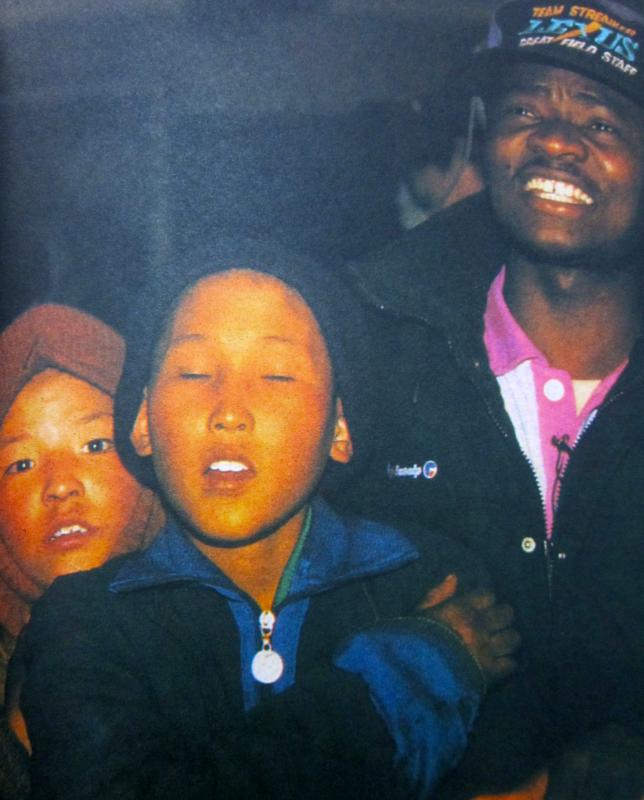
Erdenebayar is a boy of eight who misses teacher Mutombo so much that on a Monday morning (two days after Brother Lievin’s death) Erdenebayar refused to go to school. He said he didn’t want to go to school because he needed to wait for his beloved teacher. Without telling the teacher in charge where he would wait for ‘Mutombo Bagsh’, and clad in his favorite shirt & cap (seemingly given by Lievin), he left the center unnoticed. A futile search by the caretakers of the center followed. It was learned when he she showed up in the late afternoon that he had gone to the airport to wait for his ‘teacher.’
Arriving at the apartment where the wake for Brother Lievin was being observed, he made his reverential bow before the picture of Lievin displayed on a low table flanked by burning candles and incense. Afterwards, he sat on the easy chair usually occupied by Lievin and cried his heart out. After some time he slept. The people attending the wake were amazed and moved by Erdenebayar’s devotion to his deceased teacher. At this boy’s age, Lievin’s impact on him must have been very profound and deep. Erdenebayar is still in the Children’s Center. He is full of mischief but very much loved by the caretakers and by us missionaries. In him lives the memory of "Mutombo Bagsh.”
Lievin’s own description of the youth work
The young people have divided their activities into two dimensions. One is their growing in body and spirit; the other is their apostolate in social work. For their human and spiritual formation there are doctrine classes for the members of the group. They have Bible sharing and other people are invited to join them. English lessons are also provided.
For the second dimension, the young people are very much involved in the social work according to their interests and talents. They go to the Rehabilitation Center for the elderly run by Dr. E. Adya. In this government institution they talk to the elderly and groom their nails and hair. While the girls clean the kitchen, the boys bring coal to warm the center so that the residents so not literally freeze to death.
At night the young people go to visit the street children in the tunnels and the stairwells where they sleep to protect themselves from the harsh winter of Mongolia. At the same time they visit with the elderly who pass their nights in the stairwells of apartments. They share with them their life, bring tea, bread and cookies. They try to get a place for them and help then in claiming their pension from the government.
Once a week, they bathe the street children at the public showers. They visit the elderly who have no one to care for them. They prepare their clothes and clean their homes. They also visit poor families and bring wood to heat their gers (Mongolian tent). They encourage them to work and they help them find work so they will not starve.
The youth are inspired by the words of Jesus: “I assure you, as often as you did it for one of my least brothers and sisters, you did it for me.” (Matt 25, 40). The young people give witness and evangelize others through all these activities. They would like to do more but they need human and material support. From their own efforts they bake special cookies and sell them to generate income to help the homeless. Through all these activities, the Catholic Mission in Mongolia tries to propagate the Good News of Jesus.
The Angels Weep
By Sr. Pilar Verzosa, RGS
Jesus said, “Their angels see the grace of God” to emphasize the sacredness of children. However, these angels weep when they see the horrors of child abuse so common today. Maybe it was happening all along and we just didn’t know about it. Sr. Pilar Verzosa of the Good Shepherd Sisters tells us how Welcome House and the RGS Sisters are trying to help.

The phone rang at 9:00 pm. A small quivering voice asked, “Is this K-Love Radio?” “No” I said, “This is Welcome House.” The female voice spoke again, “I was listening to the radio and the announcer said I can call this number if I needed help.” Yes, we are here to help. You seem to have a problem. Do you want to tell me about it? I am Sr. Pilar. I’m a Good Shepherd sister and I am a nurse.” The connection was made.
The girl on the phone whispered, “I’m afraid. I don’t know what to do. I don’t think he will come tonight. I keep praying he will never come home anymore."
“He? Who is he?’ I asked.
“My stepfather,” she answered. And, with a little more prodding from me, she began to tell me more about herself, revealing her harrowing experience of sexual abuse from her stepfather. With more prodding, she revealed her age and her name.
One other time, the phone rang at 11pm. It was a social worker of channel 2’s Bantay Bata asking if she could bring Dada, a nine-year-old girl who was referred by a neighbor. Dada refused to go back to her house because her mother beat her up every time she failed to earn enough from sellingsampaguita on the streets.
One other day, the guidance counselor of a Catholic school referred to us Sheila, a grade six student who used to be in the honor roll but now suffered failing grades. She says her father throws things around the house and sometimes hits her whenever he is drunk. Her mother is abroad and she had to do all the household chores as well as take care of her younger siblings.
Against Human Dignity
Many think that child abuse means only sexually molestation. But the term also includes psychological and physical neglect, cruelty, deeds and works which demean the intrinsic worth and dignity of the child as a human being. Republic Act 7610 also considers as punishable unreasonable deprivation of the child’s basic needs or failure to immediately give medical treatment resulting in serious impairment of his or her growth and development or even death.
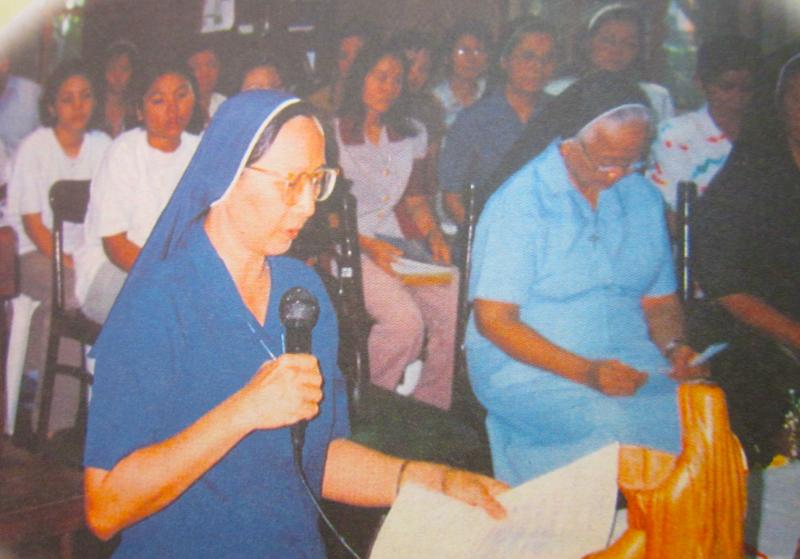
Sr. Pilar leading the prayer during the blessing of Welcome House
Liza’s Story
The trauma could be so deep-seated that some children deny the incidents ever happened. They could go through years of denial until recall is triggered of by a similar trauma. The story of Liza demonstrates what denial of child abuse could do the psyche of the person. This is her story:
I was pregnant with my fourth child and I needed help. I was 32 years old, a mother of three children, separated from my husband, but how was I going to explain to my children that the baby I was carrying was not my husband’s? How would I explain to my colleagues that a successful psychiatrist like myself was in crisis?
The thought of abortion crossed my mind; but being a doctor, I knew its consequences. The counselor at the Prolife Pregnancy Counselling suggested I opt for adoption. I thought that deciding for adoption was enough to solve my problem, but the counselor patiently led me on the delve into my past life. Her last question blew your mind. She asked me if I was molested as a child. My body began to quiver. For the first time in my life I realized that I had to confront the truth that I was sexually abused.
I was in grade school when my two uncles started molesting me. At first, I was confused and scared. I had no words to describe my feelings. I kept the secret. It happened again ... and again. There was nothing I could do to stop it. So I gave in ... and I began to enjoy what was happening as my uncles alternately used me. I isolated myself. I felt dirty like garbage. I became promiscuous and my children were sired by different men. I got married for convenience – so someone could be the father of my children. We separated within a couple of years. I was battered and lonely.
At this point I started seeing the father of my first child. I became pregnant and by the grace of God, in my desperation, I chanced upon the Pro-Life Ad in the PLDT Directory. It said: “Pregnant” Need Help? Call 526-8818.”
I dialed the number and I immediately received counseling. During the counseling session, I realized that I was caught, in a cycle of abuse. I was suffering from what the counselor called Post-Traumatic Syndrome Disorder. As a psychiatrist, I did not recognize it happening to me. I was making bad decisions because I had lost my worth as a person. It was in prayer that I understood God’s love and plan for me and that He will solve my problems if I “seek first His Kingdom and His righteousness.”
I understand how precious I am and how badly I had abused. I had abused my body because I had been abused. Those sessions helped me to resolve and to transform my past experiences into a learning experience. I looked forward to a new life completely surrendred to the Lord.
Last month, as I was preparing my family to accept my situation, I had a miscarriage, when I was finally looking forward to having a child with so much joy for the first time in my life, there was no baby to be born. The baby who saved me and allowed me to transform my life while he was a part of me for two months was gone. I cried and grieved for his loss -- a grief that I had not gone through when I lost my innocence as a child. I may not have seen the face of my baby but I felt God was telling me, “I have made your baby in My Image to bring you back to Me.”
Is Forgiveness Enough?
It takes time for some women to realize and remember some forms of violence. They may carry a sense of shame and guilt that makes them fearful that rejection and judgment will result if they reveal it. Christian teachings on forgiveness can increase the emotional pain of survivors unless it is made clear to them that forgiveness does not mean allowing things to go on as before. Since forgiveness is not a solitary action but a gesture of grace in relationships, the shape it takes often depends on the justice being enacted against the offender, and evidence of repentance on the part of the person who injured the woman, no matter how long ago it happened to her as a child.
Experience of violence damages the child’s sense of physical and spiritual integrity. Her body has been invaded against her will. She may have feelings of being unclean or needing to wash. She often feels worthless and used. She knows firsthand how fragile her person and her world is. The approach of healing must seek to restore the child’s (or the woman’s feelings of wholeness and control over her own person and life.
Violence is an encounter with the power of evil in the world. Such suffering is not random or abstract, but an experience of evil directed against her person. It threatens her trust in God and raises many faith questions: Was this somehow God’s will? Where was God when I was so in need? How could God love me and let me go through this? Is this suffering a punishment for the sinfulness in my life? What kind of world is this? Answering these questions on a personal level is part of healing. It means moving from feeling abandoned to a sense of God’s spirit with the victim.
Paths of Healing
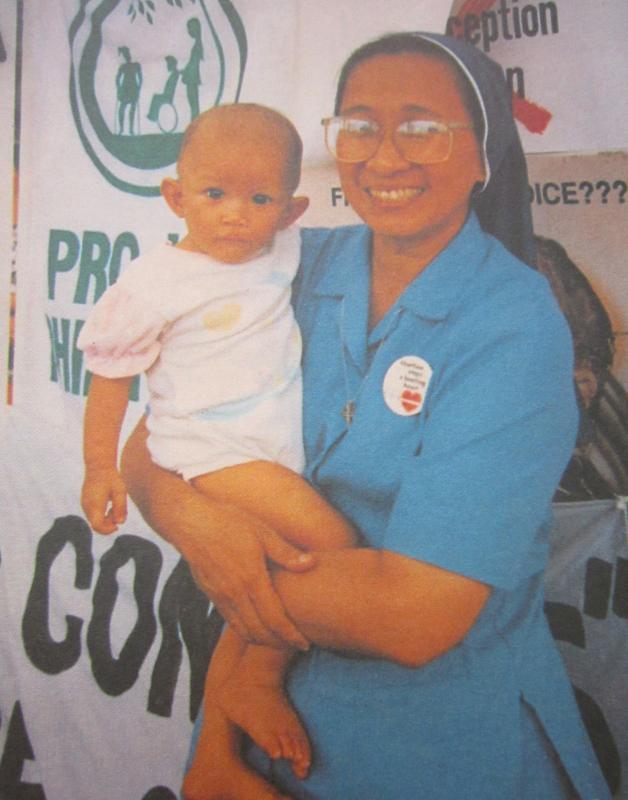
Sr. Pilar with one of the children in Welcome House
Assisting the girls and women to walk the paths to healing demands commitment, availability, creativity and faith in a God who writes straight with crooked lines. I have had to rediscover new ways of reading biblical passages with them, to help them with cleansing and healing rituals, to bring them to prayer groups for healing of memories. Encouraging them to keep a journal of their prayers, helping them deal with their dreams, which very often were nightmares, taking them on nature walks, or enjoying poems, songs and cross-stitching or painting with them gives them a sense that they are worth spending time with. Some find the exercise difficult but I make them list down all the persons in their life who have been positive as well as negative influences. Then we go to prayer -- to praise, to thank, to forgive, to intercede for each one, yes, most especially for the abuser.
The journey to recovery from child abuse is a spiritual one. Sandra M Flaherty, a survivor of child abuse, in her book Woman, Why Do You Weep? describes recovery as a painful restructuring of one’s relationship with God. However, the other side of grief is joy and wholeness. Flaherty wrote, “It resembles the Paschal Mystery of Jesus – through suffering and death there is resurrection. Having made it to be the other side of dying and rising of recovery, I have come to believe that the fundamental call of Christianity and recovery is a call to hope. It is a call to hope in despair, to believe in life amidst death, to witness to the resurrection of Jesus while living in the tomb of our grief.”
Many Jennys, Sheilas, Lizas and Dadas have come to Welcome House and say they found the compassion of Jesus, the Good Shepherd, in the security and the safety of the shelter, the routine of the daily activities that begin and end in group prayers, the listening ear of the Sisters and the companionship of the other girls and women who suffer and rejoice with them.
I have been very privileged to be a part of their recovery, their journey to a new life of hope, determination and faith.
The Gods Must Be Crazy
By Sr. Janice McLaughlin MM

Who can forget the marvelous movie THE GOD MUST BE CRAZY? It featured the so-called Bushmen of Southern Africa. As we learn from this article, their real name is the San people and many of them live in Namibia where Sr. Imelda Bautista works alongside her Maryknoll companions.
German Colony

Sr Imelda Bautista (right) coordinates education in Namibia's
48 Catholic Schools.
A fort, the statue of a German soldier with upraised rifle and the German Lutheran Cathedral dominate the skyline of Namibia’s capital, Windhoek, reminders or the country’s colonial past. Formerly South West Africa, Namibia is one of the newest independent nations in Africa and the newest mission of the Maryknoll Sisters.
Sisters Arrive
Sister Imelda Bautista of Quezon City works along with Sister Josephine Kollmer of New York and Sister Josephine Lucker of Texas. A dry rugged country, Namibia was a German colony from 1884 until 1915 when it was taken over by South Africa. It became independent in 1990 after a long liberation war by the South-West Africa People’s Organization (SWAPO) against South Africa. SWAPO leader Sam Nujoma was elected the first president of the new nation of 1.4 million people.
Evils of Apartheid
White minority rule of more than a century left poverty, unemployment and illiteracy in its wake. To heal the wounds left by apartheid (separation of races practices by South Africa). Archbishops Haushiku invited the Maryknoll Sister to his diocese. “My biggest hope is that we can empower Namibians who were oppressed to take up their rightful role in the country,” said Sr. Josephine Kollmer, “helping them get a better sense of themselves, their identity and the contribution they can make,” Sr. Kollmer is conducting a diocesan catechetical survey with Sr. Lucker and hopes to get involved in informal education programs that create jobs for women and youth. Sr. Lucker prepares the laity for pastoral ministries in urban and rural parishes. Meanwhile Filipino Sr. Imelda Bautista is acting education coordinator fro the Namibian Catholic Development Commission (NACADEC), which is responsible for all the Catholic schools in the country.
The San People
One of the commission’s concerns is the plight of the San people, commonly known as Bushmen. Expert hunters, mainly were recruited as trackers by the South African Defense Forces during the war. Fearing retaliation by the new government, many fled to neighboring countries. Those who stayed, live in poverty as squatters on the land. “They are still forgotten,” lamented Nekondo (a member of the Church Justice and Peace Commission). “There is a big gap between them and others. They have no housing, education or health care. They own no land and are being scattered.” The Church plans a program to teach them their rights and help them resettle in areas of their choice.
Small But Important
Independence aims to give more opportunities to Africans. Sr. Kollmer pointed to improved the housing, education and health care. “What the three of us (Maryknoll sisters) can do will be very small; nevertheless, it is important.”

Namibia map
The Magic Of Ordination Day
By Fr. Neil Collins
There is such a long preparation for ordination--sometimes 12 years--that no wonder it’s a day of magic and a day of destiny. Fr. Neil Collins tells us about Abe Sumalinog’s big day and Fr. Abe shares his personal feelings.
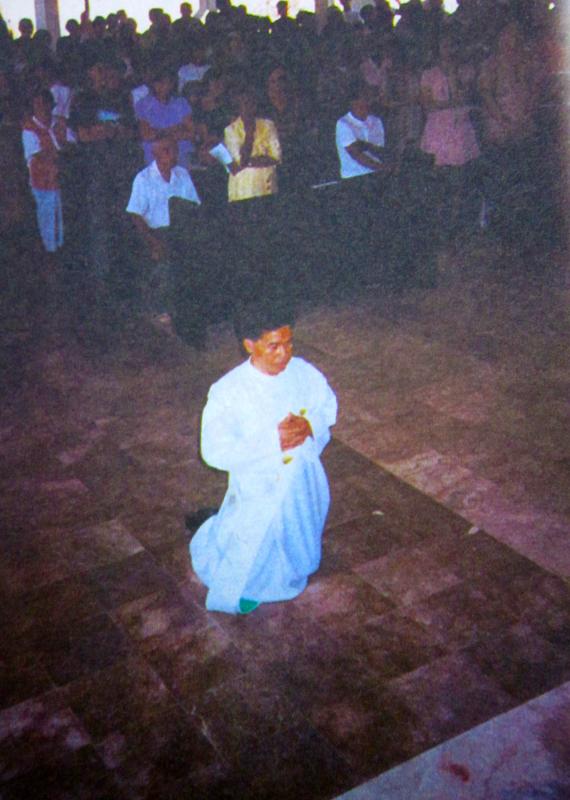
Fr Abe presents himself.
Our neighbor’s rooster woke us early which was just as well for the bus to Kumalarang was at the door just after 6:30am. Within minutes, we were all on board and climbing the hill to Dumalinao. We reminisced about all kinds of farces and tragedies and fell silent as bus passed the cemetery where one of our Columban confreres is buried. A flat tire stopped us briefly in Tubud, a place of cool and clear mountain air. Nobody complained at the delay but all enjoyed the sun or the sound of falling water. Further down the same barrio somewhere was Abe’s house. Them, we were out of the hills into broad rice fields of Kumalarang.
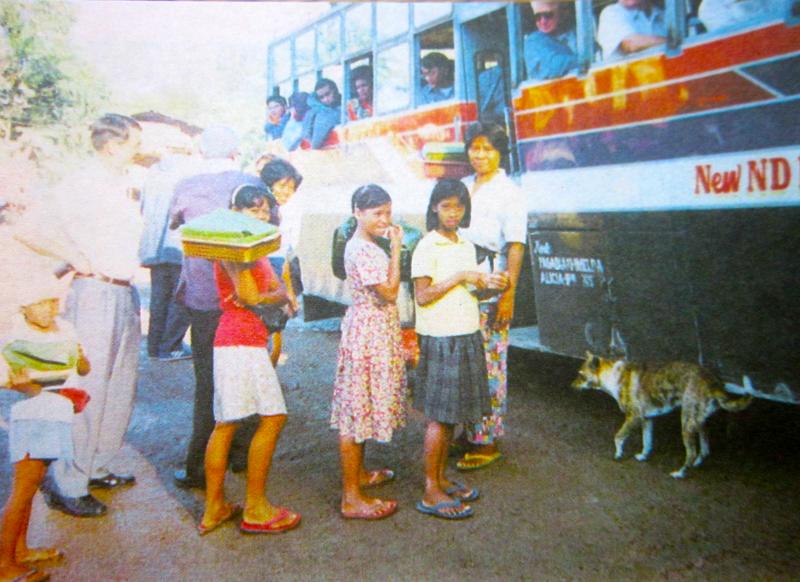
All aboard for Kumalarang
International Day
The beautiful new Church of San Isidro Labrador was already filled and the priests of the Parish, Frs. Juan Domingo Grifone and Frank Pupkowski, wasted no time in marshalling the 30 visiting priests for the ceremony. Bishops Escaler, S.J. presided in Cebuano and English. Fr. Donie Hogan, Columban Superior, later threw in a few words in Hiligaynon [the language spoken in Panay and Negros] which pleased the congregation who are settlers originally from Panay. The multicultural aspect of the day was emphasized by the presence of 11 different nationalities.
Columban History
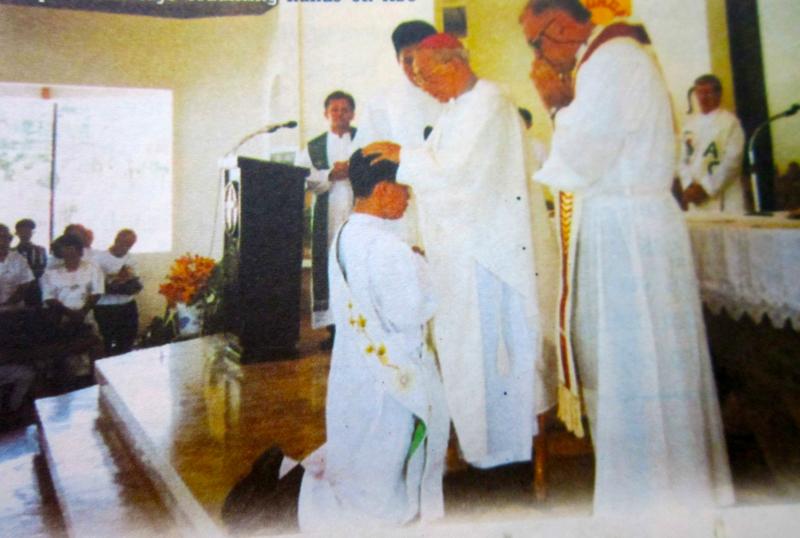
Bishop Escaler lays ordaining hands on Abe
But at the center was a quiet-spoken, dapper young man whose family could write a chapter or two of the Columban Story. Abe Sumalinog was born in Ozamis and baptized by Fr. Aodh O’Halpin. His father once taught in Our Lady of Peace High School in Malabang when Fr. Pat Fahey was a Director. And now, Abe was being ordained as a Columban missionary priest. That must be why there was a sense of fulfillment as the choir evoked St. Columban in the Litany of the Saints.
Back to Korea
After, Mass, the local community entertained us to a banquet. Then, it was all rush and farewells and forgotten barongs as we climbed onto the bus and out onto the dusty highway back to Pagadian and Ozamis, Manila and Seoul .Fr. Abe was assigned to serve the people of Dinas from February to June, help the vocations team in July, before returning to Korea in September on his second missionary journey.
A Young priest’s feeling
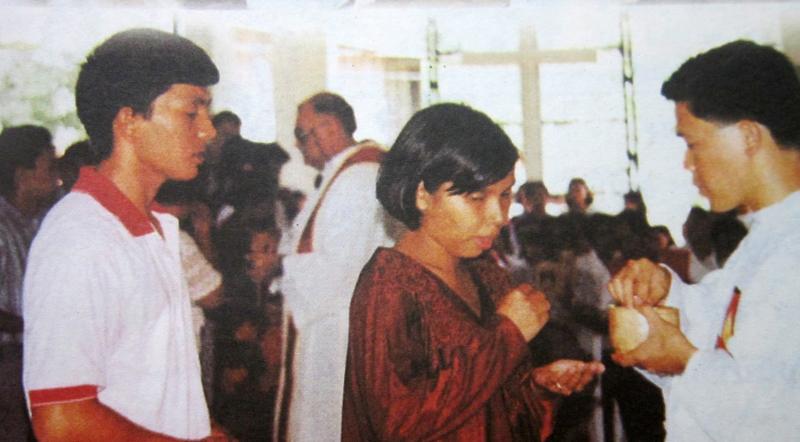
Newly ordained Fr Abe distributes Communion
I can still recall the pictures that I used to enjoy in the Bible Story Books, when I was young. During my ordination, especially when the priests laid their hands on my head, I could recall the images of the prophets and priests being anointed. I could feel God touching me and pouring His grace over me. I could feel God’s hand anointing me and giving His words: “Go and bear much fruit.” There was singing from the choir but I heard them like angels singing Hosanna. I could feel the warm hands of the priests energizing me as if giving me more strength and courage like Jesus reminding his followers not be afraid. I could really feel that it was a moment of grace pouring down from above. My heavenly feelings lifted me high but when I noticed the dust on their hands, which they accumulated from the dusty rough-country road, I was brought back to my senses that I was still on earth and this was only a beginning.
I was very glad that most Columbans whom I knew attended the celebration, particularly my Formators. When I was small I often heard a particular name of Columban father. My father is a teacher and he once worked in a Columban Parish School in Malabang in the late 1960’s. He used to recall how he ate the famous alcoholic Irish ‘plum pudding’. He could never forget Fr. Pat Fahey and his pipe for some special reasons. Fr. Pat’s name was the first Columban name that was imprinted on my mind and there he was at my ordination. He was happy to see my father and told me: “I remember him now.” After ten years of trying to recall what my father looked like it all came back to him. Thank you Fr. Pat, for being one of those whose quiet presence in my childhood made a difference. I hope I’ll be that to others too, though maybe in far away Korea.
The grace received on Ordination day grows and grows only if they young priest develops a real interior spiritual life.
We are Easter Women
By Sr. Paula Celina Mandolado RA
God, the God of the impossible
Africa at 58? God must be joking I thought, when I was asked if I want to go to the mission. Never in my 58 years had I ever entertained the idea of going to the mission or of being sent off to a far away land. I had refused offers to go abroad because I was a poor traveler. Just imagine an hour trip to Iloilo would already make me very sick. So how then can I manage the long trip from the Philippines to Africa?
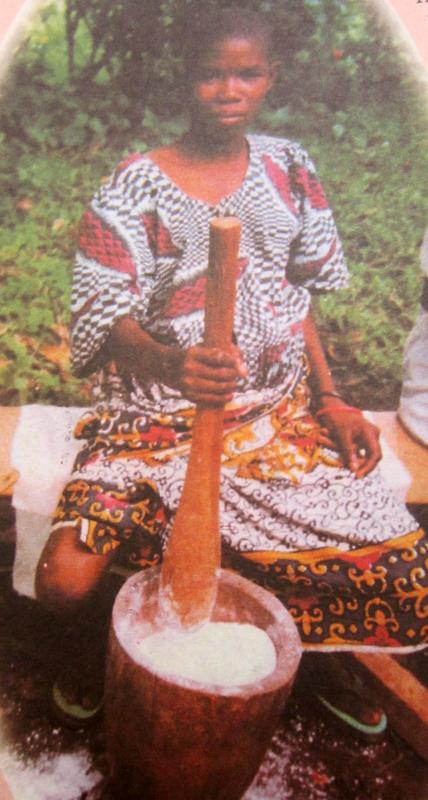
But I believe that when God makes a demand, He also gives a corresponding grace for its accomplishment. He cured me of my weaknesses and He gave me a daring spirit.
Zeal for the mission
Before I entered Assumption, I read the life of St. Therese of the Child Jesus, a great missionary without leaving her native land. Her spirit has inspired me very much and has left a deep imprint in my heart, but because of my fragile health I refrained from offering to be a missionary. Yet God had plans for me. After I was cured, a Filipino sister in West Africa asked me to teach our sisters and the people Food Preservation. I finished Home Economics major in Nutrition. By nature I love cooking and I enjoy experimenting along this area. When my Provincial asked me if I wanted to go to the mission, I answered ‘yes’ not knowing where and what I was going to do. This was in month of January.
A month in Paris to learn French
In August I received a letter from my Provincial telling me to prepare myself. My destination was Baham, Cameroon, a French speaking community. I had to leave for Paris in September 8. Of course, when I received the letter I trembled. The date of the departure was too near and I didn’t know a word of French. Anyway my missionary desire overpowered my fears. Right away I took hold of French grammar books and tapes. I read, I listened. My spirit was high, nothing could discourage me. September 8 came and I boarded Air France for Paris. Arriving in Paris I froze. The temperature was so cold, something I didn’t foresee. But the warm welcome of the sisters made me up for it. When the sister started talking to me in French I was at loss. The little French I learned just vanished from my memory. I felt I was again like a little child grasping to understand and to learn how to speak. The sisters enrolled me at a Language School for one month. The school teaches well but one month for me was not sufficient to start me off in my apostolates.
Arrival in Baham
My first month was a time of initiation to the apostolate. The sisters would bring me along with them occasionally to see other parishes and convents. After one week I took over the English classes of Sr. Anne Bernard, our Regional Superior. I accepted the work thinking that teaching English here is very simple not realizing that I needed to know French. In the beginning I was lost. If the students did not understand the word, I couldn’t explain it to them. The students were kind. They would correct my pronunciation. With humility and simplicity I allowed myself to be taught by them. So the learning process was mutual.
March to June I was sent to West Africa as planned. There I helped the sisters and some women with Food Preservations. My experiences there were experiences of total surrender to God’s hand. I went to different cities alone. The sisters would just deposit me in either trains or buses, then somebody else would meet me in the next station.
Back in Baham I was given more involvement in school. Besides English, I now taught Food Preservation to first year students. Every Friday afternoon, I teach Shebashi to the students by small groups. Shebashi is a Chinese healing art geared towards the freeing of a person from tension to inner peace. It is a healing, a relaxation to help reach a certain degree of awareness of the presence of God and of the life within us. Each movement has a particular healing effect.
They dance at Mass
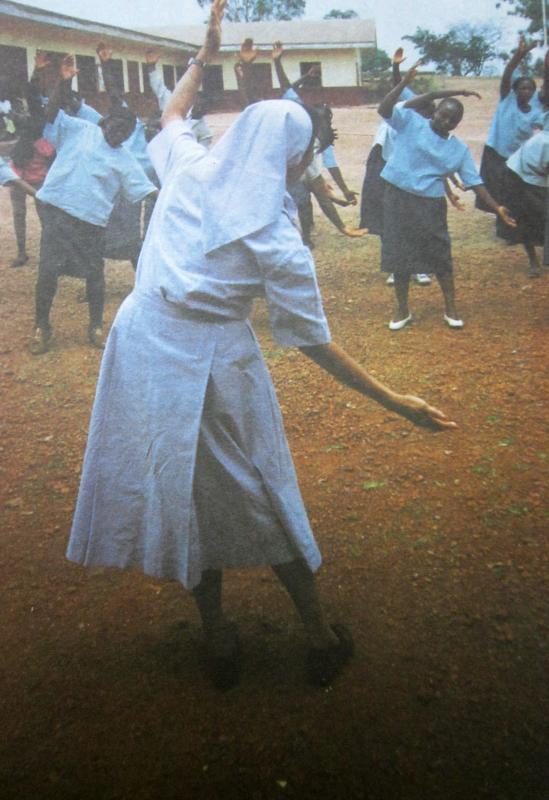
Sr. Paula giving Shebashi to her students
The African church is participative, alive and vibrant. People just love to celebrate. Sunday masses are always a celebration. They play tam-tam drums, people sing and dance. They have lots of gestures. They assign dancers for the occasion. They do not give me the impression of being in a hurry. Sundays are really dedicated for the Lord. Here feast days and Sunday masses take two hours or more.
Polygamy Prevalent
Religious vocations are rare. Our young girls cannot understand our vow of chastity. There are those who are willing and eager to become religious but they want to have babies first, at least two. When asked what they will do with their children, they will leave them to their parents. A lot of our students grow up with their grandparent or elder sisters. Polygamy is practices her so the family is very unstable. Unfortunately, with this practice it is the children who suffer most. This is one of the many things we put into consideration in our center. That is why we go for home visitation every year to every first year student.
Assumption Sisters
We Assumption Sisters are called to be Easter Women, giving hope and life to our world. Our main apostolate is Education. We try to be faithful to our mother foundress’ Guiding Principle of Education – a Philosophy that allows the good in everyone to break through every rock that imprisons it. Marie Eugene, our mother foundress, addresses the need of Being before Doing – that we be true to who we are, a religious; that our lives be centered on Christ and be rooted in the Gospel in solidarity with our people, especially the poor.